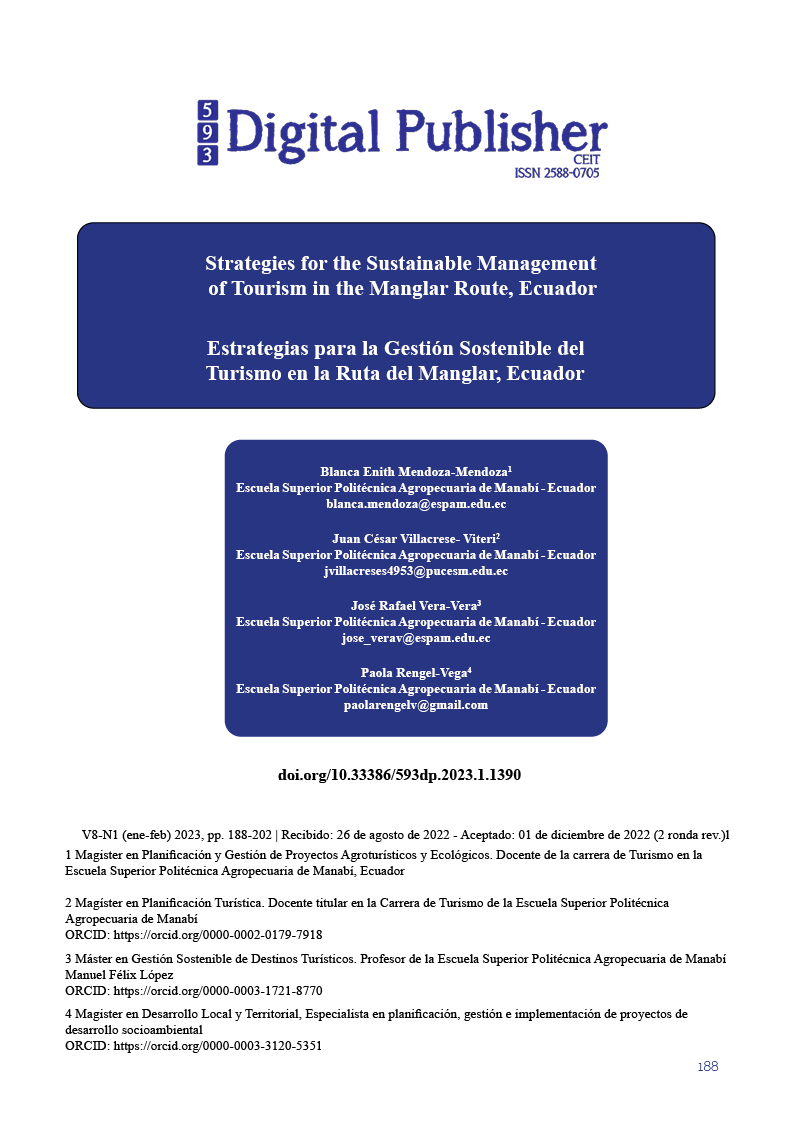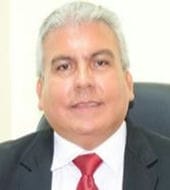Estrategias para la Gestión Sostenible del Turismo en la Ruta del Manglar, Ecuador
Main Article Content
Abstract
Sustainable tourism has become a paradigm for the development of a community at a global scale. For this reason, the objective of this work was to build strategies for the sustainable management of tourism activities in the Manglar Route located in the Costa Rica community in Ecuador. First, a diagnosis was carried out to analyze the current situation of the tourist area, which implied the three dimensions of sustainability (economic, social and environmental). Second, tourists’ expectations were analyzed to design strategies adapted to the tourists’ expectations. The strategies were defined under the principles of sustainability; for that, participatory techniques were implemented by the active participation of the community. Nine strategies were established which are mainly based on improving tourism activity; the quality of service; training the population in tourism and environmental issues through articulated work between institutions. The strategies proposed contain nineteen projects to respond to the problems and needs of the area. The implications of this study demonstrated the importance of sustainable strategies for the tourism development of the Manglar Route.
Downloads
Article Details

This work is licensed under a Creative Commons Attribution-NonCommercial-ShareAlike 4.0 International License.
1. Derechos de autor
Las obras que se publican en 593 Digital Publisher CEIT están sujetas a los siguientes términos:
1.1. 593 Digital Publisher CEIT, conserva los derechos patrimoniales (copyright) de las obras publicadas, favorece y permite la reutilización de las mismas bajo la licencia Licencia Creative Commons 4.0 de Reconocimiento-NoComercial-CompartirIgual 4.0, por lo cual se pueden copiar, usar, difundir, transmitir y exponer públicamente, siempre que:
1.1.a. Se cite la autoría y fuente original de su publicación (revista, editorial, URL).
1.1.b. No se usen para fines comerciales u onerosos.
1.1.c. Se mencione la existencia y especificaciones de esta licencia de uso.
References
Tomislav, K. (2018). The concept of sustainable development: From its beginning to the contemporary issues. Zagreb International Review of Economics & Business, 21(1), 67-94. https://doi.org/10.2478/zireb-2018-0005
Ruggerio, C. A. (2021). Sustainability and sustainable development: A review of principles and definitions. Science of The Total Environment, 786, 147481. https://doi.org/10.1016/j.scitotenv.2021.147481
Rublev, G., Bogdanova, L., Kurbatova, S., Krasnousov, S., & Kolmakov, V. (2021). Socio-economic model of sustainable development. In E3S Web of Conferences (Vol. 244, p. 10053). EDP Sciences. https://doi.org/10.1051/e3sconf/202124410053
UN-WCED (n.d.). Report of the World Commission on Environment and Development: Our Common Future. Accessed May 26, 2022. https://sustainabledevelopment.un.org/content/documents/5987our-common-future.pdf
Konold, D., & Schwietring, T. (2021). The great discrepancy: Political action, sustainable development and ecological communication. Politics and Governance, 9(1), 131-140. https://doi.org/10.17645/pag.v9i1.3631
Muñoz, G. B. C., Nechar, M. C., & Jiménez, G. C. (2020). Las políticas públicas del turismo como herramienta de cohesión social y modelo de turismo solidario en la 4T: situación y retos. RICIT: Revista Turismo, Desarrollo y Buen Vivir, (14), 132-157.
Barros, F. (2021). Alcances del turismo sostenible: un análisis cualitativo de las experiencias de dos comunidades en Ecuador. Siembra, 8(1). https://doi.org/10.29166/siembra.v8i1.2414
Mendoza, I., Rivera, M., & Vera, J. (2021). El uso de indicadores multidimensionales de sostenibilidad turística. Una aplicación para la gestión de espacios naturales protegidos en la provincia de Manabí (Ecuador). Revista interamericana de ambiente y turismo, 17(1), 47-60. http://dx.doi.org/10.4067/S0718-235X2021000100047
Fuentes, R., de la Cruz, K., & Mendoza, I. (2021). Modelo de desarrollo de turismo sostenible para comunidades rurales del cantón Bolívar. Revista Internacional de Gestión, Innovación y Sostenibilidad Turística-RIGISTUR-ISSN 2806-5700, 1(2), 19-28.
Monge, J. & Yagüe, R. (2016). El desarrollo turístico sostenible: Tren Crucero del Ecuador. Estudios y perspectivas en turismo, 25(1), 57-72. http://www.scielo.org.ar/scielo.php?pid=S1851-17322016000100004&script=sci_arttext&tlng=pt
Perrone, A., D. Cajiao y M. Burgos (2009). Turismo de naturaleza en la zona marino costera del Ecuador continental. Conservación Internacional Ecuador, Ministerio del Ambiente del Ecuador, Ministerio de Turismo del Ecuador. Guayaquil, Ecuador. Accessed May 29, 2022. http://cpps.dyndns.info/cpps-docs-web/planaccion/docs2011/oct/turismo_biodiv/Doc.3.Turismo_naturaleza_zona_marino_costera_Ecuador_continental.pdf
Torres, M., Paz, K., & Salazar, F. (2006). Tamaño de una muestra para una investigación de mercado. Boletín electrónico, 2, 1-13.
Lobelles, G. (2021). Estrategia de ciencia, tecnología e innovación en refinería Cienfuegos SA: una perspectiva para la sostenibilidad industrial. Revista Universidad y Sociedad, 13(3), 280-294. http://scielo.sld.cu/scielo.php?script=sci_arttext&pid=S2218-36202021000300280
Mesquita, A., Ferrari, M., Caldeira, F., da Freiria, L., Brandão, E., de Mattos, F., ... & de Souza, V. (2021). 5W2H na extensão rural: Estudo de multicaso na região amazônica em propriedades leiteiras de economia familiar. PUBVET, 16, 170. https://doi.org/10.31533/pubvet.v16n03a1060.1-8





